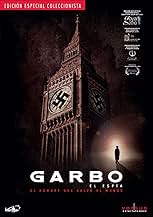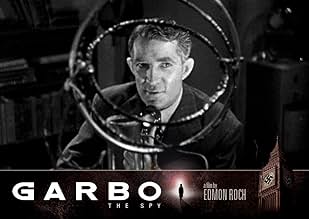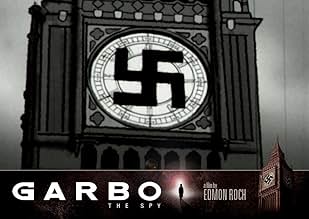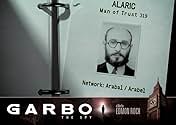Ajouter une intrigue dans votre langueA compelling account of Juan Pujol, an extraordinary Spanish double agent during WWII who helped change the course of history.A compelling account of Juan Pujol, an extraordinary Spanish double agent during WWII who helped change the course of history.A compelling account of Juan Pujol, an extraordinary Spanish double agent during WWII who helped change the course of history.
- Réalisation
- Scénario
- Casting principal
- Récompenses
- 4 victoires et 3 nominations au total
Avis à la une
I'm on a roll this week watching bad docs with subjects that should have made them much more interesting. I'm still trying to figure this one out. Obviously the interviewees think this is an amazing story, but the viewer is left wondering why—the doc takes this amazing story and tries to tell it using old movie clips whose only connection is that they were about WWII. I didn't like the fact that we are not introduced to these interviewees until midway through the film, that there are long pauses of silence (where it seems narration should have been placed but wasn't) and the music was disconcerting (to be diplomatic... to be rude, it was awful). I could see how this story would make a great Hollywood movie, but the way it was presented here, I had a hard time believing any of it was true.
Garbo: The Spy hit me like Fire in the Heartland. Again, here's a topic that I feel I am familiar with. i have seen movies about World War II, read books about the Invasion of Normandy. So, why have I never heard about this guy? Why don't I know how critical he apparently was to the whole Allied effort? If you've seen Alias or the Bournes, you know that a good spy has handlers. Garbo is the codename he received from his British handlers, because he took on various roles so well. In reality, he grew up in the Catalan region of Spain, the child of well-to-do parents, in the days before Franco. He wants to get involved. And, I will tell you we don't get to know much about his actual motivations or personality. The guy's a ghost, really. But, we get to find out what he did, offering his services to the Third Reich and to the Allies. Garbo set up an elaborate ruse that may have turned the tide of the war. He must have had iron clad insides to pull off some of these capers. I don't want to give too much away, but it's just an incredible story. And, to get it on the screen, since we don't have anything but talking heads and documents to illustrate the story, Director Edmon Roach intersperses scenes from spy films and movies about World War II that mirror real life events. It's a beautiful device and a remarkable piece of storytelling. I give Garbo: The Spy an 9 out of 10.
A compelling account of Juan Pujol, an extraordinary Spanish double agent during WWII and the only spy to be decorated by both sides . ¨Garbo: The Spy¨ , also known as Garbo, the Man Who Saved the World and Garbo: El Espia , is a Spanish documentary about Juan Pujol Garcia's role in the Second World War, well directed by Edmon Roch. It contains interviews , stock footage and fragments of films as ¨The longest day¨ with Curd Jürgens , ¨Patto¨n with George C. Scott , ¨Our Man in Havana¨ with Alec Guinnes, ¨Mata Hari¨ with Greta Garbo , ¨Appointment in Berlin¨ with George Sanders and ¨cartoon movies¨.The documentary reconstructs the career of "Garbo," who formed the centerpiece of Allied deception and counter-information to have the Nazis believe that D-Day landing would occur in Pas-de-Calais and not in Normandy , called Operation Fortitude . This documentary Garbo premiered at the Rome Film Festival on October 20, 2009, opened in Spain on December 4, 2009 and opened at the Village East Cinema in New York 2010.
It deals with his moving life , as in 1939, during the early days of World War ll, Pujol decided that he must make a contribution "for the good of humanity" (and to oppose the Franco regime) by helping Poland, Britain - which, with some of its Commonwealth realms and France, were Germany's only adversaries at the time.He initially approached the British three different times including through his wife , but they showed no interest in employing him as a spy. Therefore, he resolved to establish himself as a German agent before approaching the British again to offer his services as a double-agent.Pujol created an identity as a fanatically pro-Nazi Spanish government official who could travel to London on official business; he also obtained a fake Spanish diplomatic passport by fooling a printer into thinking Pujol worked for the Spanish embassy in Lisbon.He contacted an Abwehr agent in Madrid. The Abwehr accepted Pujol and gave him a crash course in espionage (including secret writing), a bottle of invisible ink, a codebook, and £600 for expenses. His instructions were to move to Britain and recruit a network of British agents.He moved instead to Lisbon, and - using a tourist's guide to Britain, reference books, and magazines from the Lisbon Public Library, and newsreel reports he saw in cinemas - created seemingly credible reports that appeared to come from London .During his time in Portugal, he stayed in Estoril .He claimed to be travelling around Britain and submitted his travel expenses based on fares listed in a British railway guide. Pujol's unfamiliarity with the non-decimal system of currency used in Britain at the time was a slight difficulty. At this time Great Britain's unit of currency, the pound sterling, was subdivided into 20 shillings, each having twelve pence. Garbo was unable to total his expenses in this complex system, so simply itemised them, and said that he would send the total later.During this time he created an extensive network of fictitious sub-agents living in different parts of Britain. Because he had never actually visited the UK, he made several mistakes, such as claiming that his alleged contact in Glasgow "would do anything for a litre of wine", unaware of Scottish drinking habits or that the UK did not use the metric system.His reports were intercepted by the British Ultra communications interceptions programme, and seemed so credible that the British counter-intelligence service MI5 launched a full-scale spy hunt. In February 1942, either he or his wife approached the United States after it had entered the war, contacting U.S. Navy Lieutenant Patrick Demorest in the naval attache's office in Lisbon, who recognised Pujol's potential. After he passed the security check conducted by MI6 Officer Desmond Bristow, Bristow suggested that he be accompanied by MI5 officer Tomás Harris to brief Pujol on how he and Harris should work together. Pujol's wife and child were later moved to Britain. Pujol operated as a double agent under the XX Committee's aegis; Cyril Mills was initially Bovril's case officer; but he spoke no Spanish and quickly dropped out of the picture. His main contribution was to suggest, after the truly extraordinary dimensions of Pujol's imagination and accomplishments had become apparent, that his code name should be changed as befitted 'the best actor in the world'; and Bovril became "Garbo", after Greta Garbo. During planning for the Normandy beach invasion, the Allies decided that it was vitally important that the German leaders be misled into believing that the landing would happen at the Strait of Dover by means of Operation Furtitude . In order to maintain his credibility, it was decided that Garbo should forewarn the Germans of the timing and some details of the actual invasion of Normandy, although sending it too late for them to take effective action. Special arrangements were made with the German radio operators to be listening to Garbo through the night of 5/6 June 1944, using the story that a sub-agent was about to arrive with important information. However, when the call was made at 3 AM, no reply was received from the German operators until 8 AM. This enabled Garbo to add more, genuine but now out-of-date, operational details to the message when finally received, and thus increase his standing with the Germans. Garbo told his German contacts that he was disgusted that his first message was missed, saying "I cannot accept excuses or negligence. Were it not for my ideals I would abandon the work. Part of the "Fortitude" plan was to convince the Germans that a fictitious formation-First U.S. Army Group, comprising 11 divisions , commanded by General George Patton-was stationed in southeast Britain.
It deals with his moving life , as in 1939, during the early days of World War ll, Pujol decided that he must make a contribution "for the good of humanity" (and to oppose the Franco regime) by helping Poland, Britain - which, with some of its Commonwealth realms and France, were Germany's only adversaries at the time.He initially approached the British three different times including through his wife , but they showed no interest in employing him as a spy. Therefore, he resolved to establish himself as a German agent before approaching the British again to offer his services as a double-agent.Pujol created an identity as a fanatically pro-Nazi Spanish government official who could travel to London on official business; he also obtained a fake Spanish diplomatic passport by fooling a printer into thinking Pujol worked for the Spanish embassy in Lisbon.He contacted an Abwehr agent in Madrid. The Abwehr accepted Pujol and gave him a crash course in espionage (including secret writing), a bottle of invisible ink, a codebook, and £600 for expenses. His instructions were to move to Britain and recruit a network of British agents.He moved instead to Lisbon, and - using a tourist's guide to Britain, reference books, and magazines from the Lisbon Public Library, and newsreel reports he saw in cinemas - created seemingly credible reports that appeared to come from London .During his time in Portugal, he stayed in Estoril .He claimed to be travelling around Britain and submitted his travel expenses based on fares listed in a British railway guide. Pujol's unfamiliarity with the non-decimal system of currency used in Britain at the time was a slight difficulty. At this time Great Britain's unit of currency, the pound sterling, was subdivided into 20 shillings, each having twelve pence. Garbo was unable to total his expenses in this complex system, so simply itemised them, and said that he would send the total later.During this time he created an extensive network of fictitious sub-agents living in different parts of Britain. Because he had never actually visited the UK, he made several mistakes, such as claiming that his alleged contact in Glasgow "would do anything for a litre of wine", unaware of Scottish drinking habits or that the UK did not use the metric system.His reports were intercepted by the British Ultra communications interceptions programme, and seemed so credible that the British counter-intelligence service MI5 launched a full-scale spy hunt. In February 1942, either he or his wife approached the United States after it had entered the war, contacting U.S. Navy Lieutenant Patrick Demorest in the naval attache's office in Lisbon, who recognised Pujol's potential. After he passed the security check conducted by MI6 Officer Desmond Bristow, Bristow suggested that he be accompanied by MI5 officer Tomás Harris to brief Pujol on how he and Harris should work together. Pujol's wife and child were later moved to Britain. Pujol operated as a double agent under the XX Committee's aegis; Cyril Mills was initially Bovril's case officer; but he spoke no Spanish and quickly dropped out of the picture. His main contribution was to suggest, after the truly extraordinary dimensions of Pujol's imagination and accomplishments had become apparent, that his code name should be changed as befitted 'the best actor in the world'; and Bovril became "Garbo", after Greta Garbo. During planning for the Normandy beach invasion, the Allies decided that it was vitally important that the German leaders be misled into believing that the landing would happen at the Strait of Dover by means of Operation Furtitude . In order to maintain his credibility, it was decided that Garbo should forewarn the Germans of the timing and some details of the actual invasion of Normandy, although sending it too late for them to take effective action. Special arrangements were made with the German radio operators to be listening to Garbo through the night of 5/6 June 1944, using the story that a sub-agent was about to arrive with important information. However, when the call was made at 3 AM, no reply was received from the German operators until 8 AM. This enabled Garbo to add more, genuine but now out-of-date, operational details to the message when finally received, and thus increase his standing with the Germans. Garbo told his German contacts that he was disgusted that his first message was missed, saying "I cannot accept excuses or negligence. Were it not for my ideals I would abandon the work. Part of the "Fortitude" plan was to convince the Germans that a fictitious formation-First U.S. Army Group, comprising 11 divisions , commanded by General George Patton-was stationed in southeast Britain.
Garbo was a Spanish secret agent during World War II who sold his independent services to the Nazis, while really working for the allies. His brilliantly imaginative approach to espionage was to invent dozens of fictional subordinate spies, then make up false information to feed to the Germans.
This potentially interesting subject was spoiled by an odd attempt at a documentary that appears to have been intended to be artistic and funny, rather than informational. The film bounces back and forth between talking heads who remain unidentified until halfway through, and clips from old B movies. All this is accompanied by irrelevant, anachronistic music and silly science fiction sound effects. The overall result is unfocused, annoying, and almost unwatchable.
This potentially interesting subject was spoiled by an odd attempt at a documentary that appears to have been intended to be artistic and funny, rather than informational. The film bounces back and forth between talking heads who remain unidentified until halfway through, and clips from old B movies. All this is accompanied by irrelevant, anachronistic music and silly science fiction sound effects. The overall result is unfocused, annoying, and almost unwatchable.
As a WW2 buff I am reasonably au fait with the deceptions around the Normandy landings. However that was not really relevant as the film provides enough information for any viewer.
In a quirky film that teases you along it is a little gem and a great story - but true story. The director manges to in a sense bamboozle the viewer so what is true and what is mirage is not really explicit until one is gripped by the tale. The inter-cutting of news reels and fictional spy movies provides atmosphere and refreshes the memory on what a confused arena Europe was in the thirties and forties.
I defy anyone not to be better informed and amused by this excellent film.
In a quirky film that teases you along it is a little gem and a great story - but true story. The director manges to in a sense bamboozle the viewer so what is true and what is mirage is not really explicit until one is gripped by the tale. The inter-cutting of news reels and fictional spy movies provides atmosphere and refreshes the memory on what a confused arena Europe was in the thirties and forties.
I defy anyone not to be better informed and amused by this excellent film.
Le saviez-vous
- AnecdotesAs the credits roll (after showing the names of those who appeared on film), additional information are revealed. Winston Churchill's quote of "In wartime, truth is so precious that she should always be attended by a bodyguard of lies" "To Annia" As he worked for the MI5, Pujol's telephone was tapped and his private correspondence underwent censorship. He was never left alone. He could only use invisible ink under the supervision of a member of the Secret service. He never met any other agent, entered the MI5 premises, or knew his position in the Organization. He never tried to find out more, or ever complained. After the War, MI5 wanted Pujol to spy on Russia. For unknown reasons, he did not accept. He spent all his fortune on land in Venezuela. In 1948, his property was assaulted and destroyed. He sold it at a quarter of the value. Juan Pujol managed to fight two wars serving both sides. Never fired a single shot. His vivid imagination produced over 50 volumes of writings. Thus he spared thousands of lives. On both sides.
Meilleurs choix
Connectez-vous pour évaluer et suivre la liste de favoris afin de recevoir des recommandations personnalisées
- How long is Garbo: The Spy?Alimenté par Alexa
Détails
- Date de sortie
- Pays d’origine
- Site officiel
- Langues
- Aussi connu sous le nom de
- Garbo: The Spy
- Lieux de tournage
- Barcelone, Catalogne, Espagne(Studio)
- Sociétés de production
- Voir plus de crédits d'entreprise sur IMDbPro
Box-office
- Montant brut aux États-Unis et au Canada
- 28 563 $US
- Week-end de sortie aux États-Unis et au Canada
- 5 593 $US
- 20 nov. 2011
- Montant brut mondial
- 356 050 $US
- Durée1 heure 28 minutes
- Mixage
- Rapport de forme
- 1.85 : 1
Contribuer à cette page
Suggérer une modification ou ajouter du contenu manquant

Lacune principale
By what name was Garbo: El espía (2009) officially released in Canada in English?
Répondre















